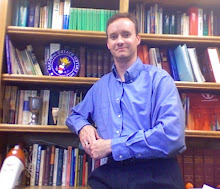Words have Uses, Not Meanings
Working on the "Reason for speaking in parables" pericope tonight has reiterated for me a realization I made a long time ago:
Words have uses, not meanings.
| From The Reason for Speaking in Parables | ||
|---|---|---|
| Mat 13:13 ...ὅτι βλέποντες οὐ βλέπουσιν καὶ ἀκούοντες οὐκ ἀκούουσιν οὐδὲ συνίουσιν, | Mark 4:12 ...ἵνα βλέποντες βλέπωσιν καὶ μὴ ἴδωσιν, καὶ ἀκούοντες ἀκούωσιν καὶ μὴ συνιῶσιν, | Luke 8:10 ...ἵνα βλέποντες μὴ βλέπωσιν καὶ ἀκούοντες μὴ συνιῶσιν. |
| Mat 13:13 ...that seeing they do not perceive and hearing they do not listen, | Mark 4:12 ...in order that looking they may indeed see, but not perceive, and that listening they may indeed hear, but not understand, | Luke 8:10 ...so that looking they may not perceive, and listening they may not understand. |
Words have uses, not meanings. I can easily say:
"That's well and good that you're listening, but can you really hear what I'm saying?"
or
"I know he heard me, but was he listening to me?"
In either case, my point is clear. It is the usage that conveys the meaning, not any inherent denotation.
Just good to remind myself.


6 comments:
Hi Joe,
Don't words have both meanings and uses? A word's meaning(s) is its semantic range, but the 'meaning' of a word in context is also determined by its usage (pragmatics).
Surely you wouldn't find many linguists who would say that words don't have meanings.
"Surely you wouldn't find many linguists who would say that words don't have meanings."
Well, only good ones.
It's probably more accurate to say that "Some words have uses, not meanings" (e.g., deictics like "here" or "there" and function words like prepositions which have little semantic content). Some words do in fact have meaning but no particular special cases of usage: e.g., the color word "blue," for instance.
Because of the particular connotations I associate with "hearing" (involuntary auditory sensation) and "listening" (conscious appropriation), your first English example sentence seems to use them backwards while the second one makes sense. This could just be me, but it does highlight reception issues. Or to show that the same word can have multiple uses and meanings, "Beethoven could no longer hear, but he still heard music within."
An interesting question is why is it that there came to be several different words (verbs, in your Greek example) that do overlap semantically and/or functionally? One can invoke the process of "semantic bleaching" to explain some of these cases, but at some point in the past, these words must have actually meant differently enough to justify their adoption or retention side by side in the language.
Another explanation for Mark 4:12's diction, of course, is simply that it is a quotation of LXX Isaiah 6:9, whose translator chose βλέπω for ראה and ὁράω for ידע...
Well, J.P., the comment about choosing translation words is of course correct. The coexistence of overlapping of words that share semantic domains is a real-world issue, not a semantic one. Different etymologies, different classes, cultures, these things make up those phenomenon.
If you insist on statements less provocative, I'd still be content is saying that a word's meaning is only limited by its use. And any meaning you would argue that a word doesn't have, I would say that this is just a use that has yet to have been made (or that you're not yet familiar with).
We could brainstorm a truckload of words whose current semantic fields would never have been anticipated 100 years ago until new uses were made.
I'm afraid I didn't get your point about the word "blue" having a meaning but no particular special cases of usage. The comment just made me blue.
"Well, only good ones."
Perhaps I should have said, "Surely you wouldn't find many linguists who would say that no words have meanings.
Maybe you know better linguists than I do.
: )
Post a Comment